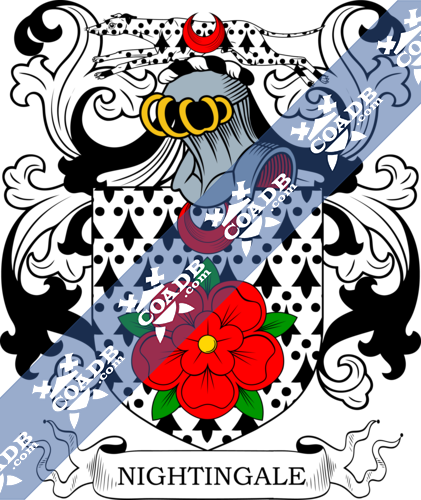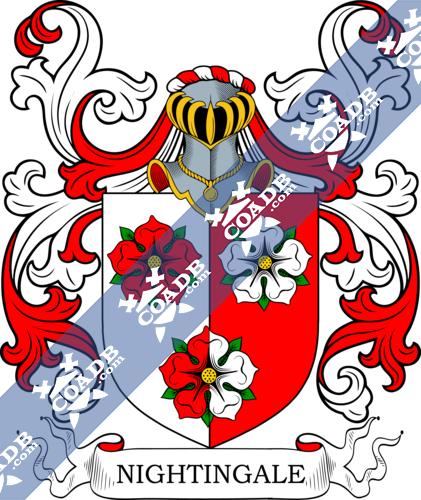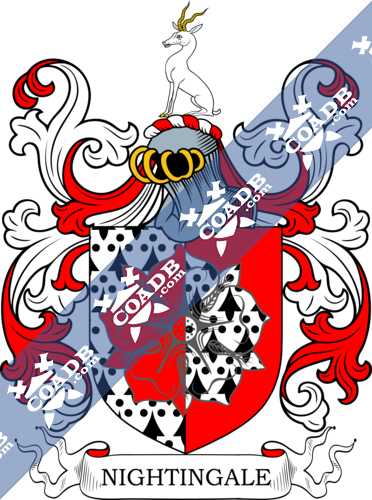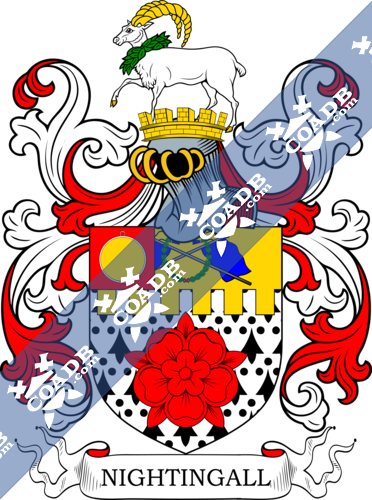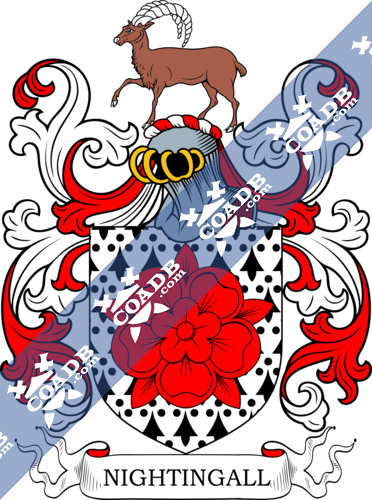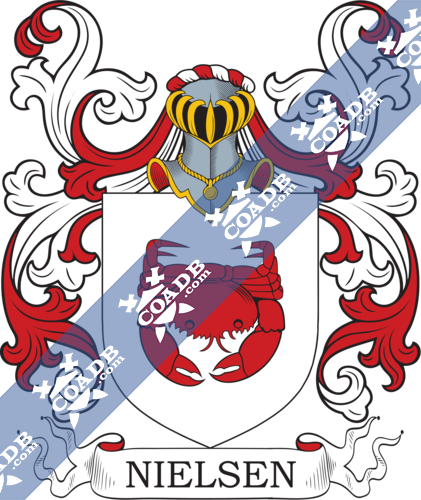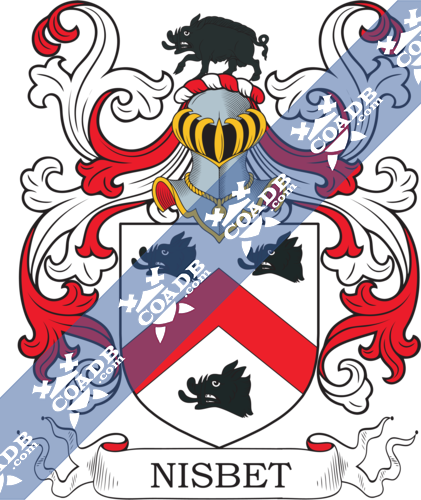Nightingale Family Crest, Coat of Arms and Name History
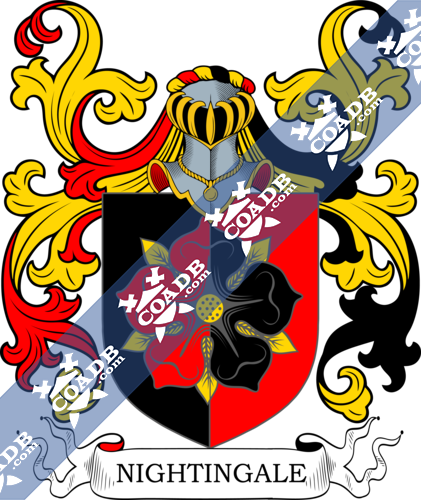
Nightingale Coat of Arms Gallery
Don’t know which Coat of Arms is yours?
We can do a genealogical research. Find out the exact history of your family!
Learn MoreNightingale Origin:
England
Origin of Nightingale:
It is unique and interesting surname which comes from Anglo-Saxon in origin and is a nickname for an individual with a great, sweet singing voice, more precisely from the bird, the nightingale. The foundation of this surname associated with the Olde English pre 7th Century word “nihtegal,” itself derived from the word “niht” which means ‘night,’ plus “galan” which means “to whistle or sing” and in Middle English the word “nichti(n)gale.” The names of birds were frequently used as a nickname in old England, from some authentic or assumed similarity to a bird. Further examples are Finch, Hawk, Jay, and Lark. The surname evolution since 1176 has consisted of Richard Nihtingale (1227, Bedfordshire), Alan Nightegale (1260, Cambridgeshire) and Henry Nitingale (1287, London). In the new era, the surname can be organized and listed as Nightingale, Nightingall, and Nightingirl. Possibly, the most famous bearer of the name was Florence Nightingale (1820 – 1910), who was an English nurse, recognized as the Lady of the Lamp, famous for her work during the Crimean War. She helped to boost the rank of the nursing occupation and in 1860 a training school established for nurses in London.
Variations:
More common variations of this surname are: Knightingale, Nightinggale, Nightinagale, Nightingayle, Nightingal, Nightingle, Nightngale, Nightengale, Nightingall, Nightinggle.
England:
The name Nightingale was first found in Norfolk where they held a family seat from ancient times and given an estate by Duke William of Normandy, their true King, for their important services at the campaign of Hastings in 1066 A.D.
The very first recording spelling of the family was shown to be that of Walter Nichtegale, which was dated 1176, in the “Pipe Rolls of Gloucestershire.” It was during the time of King Henry II who was known to be “The Builder of Churches,” 1154 – 1189.
United States of America:
Individuals with the surname Nightingale settled in the United States in four different centuries respectively in the 17th, 18th, 19th and 20th. Some of the people with the name Nightingale who settled in the United States in the 17th century included Thomas Nightingale, who come to Virginia in 1648. Tho Nightingale, who landed in Virginia in 1648. Kath Nightingale, who arrived in Virginia in 1649. William Nightingale, who came to Massachusetts in 1690.
Some of the people with the name Nightingale who settled in the United States in the 18th century included Mathew Nightingale settled in Virginia in 1764. Henry Nightingale came to Charleston in 1792.
Some of the people with the name Nightingale who settled in the United States in the 19th century included Thomas Nightingale, who came to Philadelphia in 1802. A.F. Nightingale at the age of 52, who emigrated to the United States, in 1896.
Some of the people with the name Nightingale who settled in the United States in the 20th century included Alma Sabina Nightingale at the age of 7, who settled in America from Allett Yorks, England in 1906. Arthur P Nightingale at the age of 26, who settled in America from Dorset, in 1906. Alice Nightingale at the age of 28, who emigrated to America from Bury, England, in 1907. Alice Nightingale, at the age of 21, who landed in America from London, England, in 1908. Arthur P. Nightingale, at the age of 29, who emigrated to the United States from Salisbury, England, in 1908.
New Zealand:
Some of the people with the name Nightingale who settled in New Zealand in the 19th century included William Nightingale arrived in Auckland, New Zealand aboard the ship “Nimroud” in 1860.
Here is the population distribution of the last name Nightingale: United States 5,167; England 7,738; Australia 1,708; Canada 1,245; Wales 327; Kenya 314; Scotland 269; South Africa 1,589; Germany 235; New Zealand 566.
Notable People:
Nightingale Baronets was a famous personality in the Baronetage of England.
Albert Nightingale (1923–2006), was an English football player.
Andrea Nightingale was an American professor.
Annie Nightingale (born 1942), is a British radio announcer.
Anthony Nightingale (born 1947), is a Hong Kong businessman.
Benedict Nightingale (born 1939), is a British scholar.
Danny Nightingale (born 1954), is a British modern pent athlete.
Danny Nightingale (soldier) (born 1975), is a British fighter.
David Nightingale was an English football player.
Earl Nightingale (1921–1989), was an American leader.
Florence Nightingale (1820–1910), was a British pioneer of modern nursing.
Blazons & Genealogy Notes
1) (Kneesworth Hall, co. Cambridge, bart.). (Newportpond, co. Essex). Per pale erm. and gu. a rose counterchanged. Crest—An ibex sejant ar. tufted, armed, and maned or.
2) (Neale, co. Essex). Per pale sa. and gu. a rose counterchanged, barbed vert, seeded or.
3) (Lichfield, London, and co. Warwick; granted 1593). Erm. a rose gu. seeded or, barbed vert, a crescent for diff. Crest—A greyhound courant erm. charged with a crescent for diff.
4) (Ballygran, co. Wexford; Fun. Ent. Ulster’s Office, 1632, of Isabel, wife of Luke Nightingale, Esq.. of Ballygran). Per pale ar. and gu. three roses counterchanged, leaved vert, seeded or.
5) (Brome Hall, co. Norfolk). Erm. a rose gu. on a chief embattled or, two banners in saltire, the staves enfiled by a wreath of laurel ppr. a canton gu. charged with the representation of a medal. Crest—On a mural crown or, an ibex ar. horned, maned, and tufted or, gorged with a wreath of laurel vert.
6) Erm. a rose gu. Crest—An ibex ppr.

